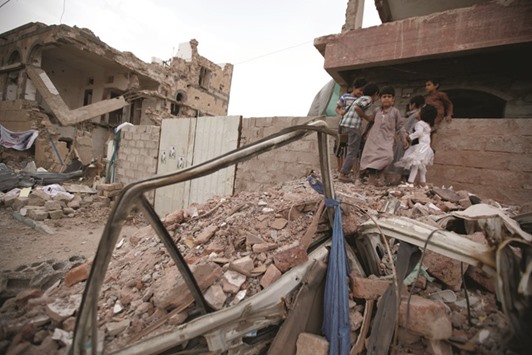A Saudi-led military coalition said it intercepted a missile fired in Yemen yesterday and residents said an air strike by the alliance caused eight civilian casualties, straining a civil war ceasefire.
The ballistic missile was fired toward the central city of Marib, which is controlled by Saudi-backed government forces, but was intercepted and destroyed along with the source of the launch, the coalition said in a statement without elaborating.
Saudi Arabia and its Gulf Arab allies intervened in a civil war in March 2015 on behalf of the internationally backed government of President Abd-Rabbu Mansour Hadi against the Iran-allied Houthi group, which controls the capital Sanaa.
Peace talks in Kuwait between the government and Houthis have dragged on for two months with few concrete results, while a truce has dampened fighting that killed at least 6,400 people and plunged impoverished Yemen into a humanitarian crisis.
United Nations Yemen envoy Ismail Ould Cheikh Ahmed appealed to the parties yesterday to “quicken the pace” of the talks.
He told the UN Security Council he would present a written concept in the coming days for the next stage.
“The Kuwait talks have progressed slowly, yet constructively,” he said.”The parties to the negotiations now have the responsibility to find a political solution for the pending issues, which revolve mainly around the timeline and sequencing of the different steps.”
Residents in a mountainous area of Lahj province said a Saudi-led air strike late on Monday targeted Houthi forces who advanced into the area the day before, causing eight civilian casualties.
It was not clear how many of those may have been killed.
A coalition spokesperson did not immediately respond to a Reuters request for comment.
The strategic Jalis mountain area is near al-Anad, a major military and air base that once hosted US counterterrorism forces deployed to fight Al Qaeda in the Arabian Peninsula.
In the town of Jaar, about 60km (40 miles) east of Anad, residents said AQAP fighters mobilised at the local prison and freed several inmates.
The militants took advantage of wartime chaos to seize a broad swath of the country but pulled out of Jaar without a fight in May as part of a deal with local tribesmen.

Children play next to houses destroyed during a vigil marking one year since a Saudi-led air strike started on a residential area in Sanaa, Yemen, yesterday.
